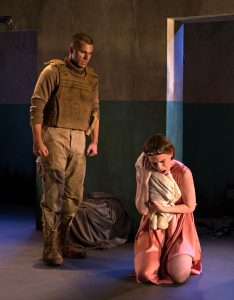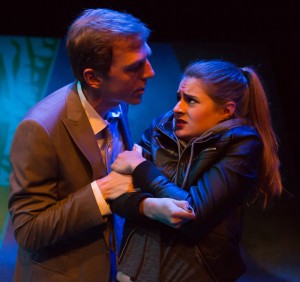Technology is being used more, and more inventively, in scenic and production design for the theater. Social media has become a vital part of marketing—and occasionally casting—shows. But tech has yet to make a big impression in theater as a subject. Three decades into the 21st century, plays about life in the digital age are still scarce. (Maybe that’s why Job, which recently transferred to Broadway, hit a nerve.)
Maiden Voyage
In spite of the progress that women have made over the years when it comes to achieving gender equality, Cayenne Douglass’s new play, Maiden Voyage, shows that women need to stop overcompensating and simply act authentically in their workplace. Directed by Alex Keegan, and coinciding with Women’s History Month, this drama takes one five fathoms deep into the ocean and a distaff Navy world.
Bad Penny and Sincerity Forever
Mac Wellman is a grand master of absurdity, and the Flea Theater is currently presenting a festival of five plays in rotating repertory. Two of them, Bad Penny and Serenity Forever, are classic examples of Wellman’s work, which often weaves together an exploration of the everyday with mythology, the metaphysical, and American consciousness.
Good Friday
The New York premiere of Kristiana Rae Colón’s new play Good Friday could not have come at a more imperative time in our culture. In an age when baby boomers’ once-earnest activism (the women’s movement of the 1970s) has been replaced by millennials’ equally well-meaning, but less effective “slacktivism” (#MeToo, #YesAllWomen), what does it mean in this day and age to call oneself a feminist? And what happens when women are forced to confront their belief systems, however different, just as a crisis occurs?
Emma and Max
Todd Solondz is one of the few white, male enfants terribles of ’90s American independent cinema to maintain the incisive edge that made his reputation. While contemporaries such as Richard Linklater, Gus Van Sant and Steven Soderbergh have built careers out of the ideological compromises that come with a Hollywood budget, Solondz has paid the price for his obstinacy, making only eight films in nearly 30 years and moving to the margins of culture. For most people, Solondz is the man who made a pedophile sympathetic in 1998’s Happiness, but his true signature is the ability to cut through identity politics to expose the fear, anxiety, and depression at the center of the American dream.
Scraps
Scraps, a new work by award-winning playwright Geraldine Inoa, begins like an ancient Greek play would—with a prologue that sets the stage for the drama. In Scraps, however, a character, Jean-Baptiste (Roland Lane) raps the prologue from the stoop of an apartment building in Bedford-Stuyvesant, Brooklyn. “Allow me to be your Greek chorus,” he says to the audience, and his rhymes paint a portrait of the neighborhood in 2014, where the injustices of police violence are keenly felt. Indeed, a police officer has just shot neighborhood local Forest Winthrop, who was on the way home with diapers for his son.
Fill Fill Fill Fill Fill Fill Fill
Despite being written and directed by women, Steph Del Rosso’s Fill Fill Fill Fill Fill Fill Fill [or Fill x 7], directed by Marina McClure, is a macho exploration of the female condition. The production at the Flea Theater’s Siggy space, named for Sigourney Weaver, kicks off with confidence, succeeding in creating a stadium-sized atmosphere in a substantially smaller area. The raunchy, adrenalin-infused performance that Roland Lane gives as Noah, an ego-bound pop star on his Break-Up tour, fuels the theater with pheromones. He charms his demure, unsuspecting photographer girlfriend, Joni, acutely performed by Sarah Chalfie, from backstage onto the stage, like a deer in the headlights, and proceeds to embarrass her, leaving her mortified and alone.
When Women Burn
The visual imagery presented in The Flea's The Trojan Women strikes two seemingly disparate chords upon viewing. One is of The Rape of the Sabine Women, an ancient Roman story about soldiers who arrived on the shores of Italy. The men abducted and otherwise ravished a group of Sabine women. Another image, more overt (and one we are asked to leave the theater with), is the violent uprooting of millions of Syrian refugees from their homes. As Hecuba, Helen, Andromache and Cassandra bitterly mourn their fallen city, we cannot help but think of their lives in a foreign, hostile country, as they are carried off in boats that are almost as precarious as their hollow futures.

This resonance, sometimes obvious and sometimes thrillingly unspoken, is the beating heart of this drama, written by the silver-tongued Ellen McLaughlin. Enveloping this drama, which has survived well past its antiquarian origins, is the tragic, antediluvian helplessness of postwar women at the hands of their conquerors. It is the human tension of the play, with its mostly female cast, that rings through McLaughlin's words and lifts the story into beautiful, complex territories. Directed by Anne Cecelia Haney and under the much-lauded artistic directorship of Niegel Smith, this adaptation of Euripides' antebellum narrative, if occasionally flighty, is moving and cinematic in its scope.
The play begins with the drugged monotone of waves crashing against a beach, as we are welcomed into The Flea's downstairs theater. It seats perhaps forty—the intimacy of the space threatens our bubble of suspended disbelief. As if painted onto the wall, a turbaned, blindfolded woman sits, waiting. On the floor lie some six women—this is the Chorus—curled up and covered in grey blankets. The music of the sea gradually bestirs the blindfolded woman, and from her commanding voice and gait, we gather that she is Hecuba (played by a marvelous DeAnna Supplee), former queen of Troy and war prize for the Greeks. The women of Troy have been captured by their enemies the Greeks following the sack of Troy, and are waiting to be shipped off to kings' courts as slaves, concubines or second wives—harder luck perhaps than their Sabine ancestors. Cassandra (a powerful Lindsley Howard) and Andromache (Casey Wortmann, wonderful) are among the most haunted: the former has been 'made mad' by the god Apollo for spurning his love, and the latter is the widow of Hector, a fallen Trojan prince. All are violently helpless and burning with war trauma, with nothing to do but wait.
Haney has expertly interpreted McLaughlin's words, which retain most of the flair and poetry of Euripides' original. As the Trojan women dream of their future lives, they repeat stories of far off countries: "If you wash your hair in their rivers," one of them says, "they come out gold." Haney builds particular emphasis around this optimism, for it is mirrored in the current refugee crisis that has shaken the world with its sorrow. Here is where McLaughlin, who first adapted the story with the Bosnian war and its aftermath in mind, becomes fickle: the plot is held together by the barest of backbones, and for all the characters' elegies and monologues, there are times when the postwar narrative seems too forced, too distant. But when we are reminded, it is powerful: doctors, engineers and artists leave behind their burning cities for lives as taxi drivers, postmen and even unemployment, just as Hecuba, Andromache, and their once regal companions become less than their former selves. They resign themselves to lives of physical and emotional imprisonment.
Hecuba embodies all the nostalgia, mad sorrow and pride of her fallen Trojan citizens. Supplee delivers the fallen queen's lines with wounded ferocity; even when she whispers, there is weight and regality behind it. Tears shine perpetually in Hecuba's eyes—her only equal is Helen (Rebeca Rad), played with a great deal more pathos and wit than the original character is intended to have. In the 1971 film, starring the luminescent Vanessa Redgrave and Katharine Hepburn as Andromache and Hecuba respectively, Helen is a teasing, dangerous, one-dimensional male fantasy (both ancient playwright and seventies era director were male, after all). Rad anneals this fantasy with humanity; her lines are the most moving ones McLaughlin has written in the play.
The entrance of a male soldier, Talthybius (Phil Feldman) towards the end spins the play into a climax. Suffice it to say, he is dressed in combat gear and bears bad news for the women, just as they have seemingly reconciled themselves to their futures. In happier moments, the play has spontaneous moments of song and dance, welcome augmentations to the narrative. Lighting and sound design (Scot Gianelli and Ben Vigus respectively) are both characters of their own, booming and crackling with emotion as the play progresses. Both are also responsible for the cinematic sweep of the concluding scenes, perhaps some of the best minutes of The Trojan Women. Come for the nostalgia and the instructive, present performances, but stay for those dying moments.
The Trojan Women runs through Sept. 26. Performances are Thursday through Saturday at 9 p.m. and Sunday at 3 p.m. Tickets are $15-$20 with the lowest priced tickets available on a first-come, first-served basis. The Flea Theater is located at 41 White St. between Church St. and Broadway. Purchase tickets by calling 212-352-3101 or visit theflea.org.
Crossing Into Madness
The filth, danger and enchantment of the South comes alive in Adam Rapp’s Wolf in the River and it all takes place around a fresh mound of earth with intoxicating purple flowers. The Man (Jack Ellis) is a shapechanger and he stands barefoot in the dirt, like he is on a soapbox, and counts each audience member one at a time. He is shirtless and holds his torso firmly as he moves around the room demonstrating his dominance. The shapechanger can supernaturally change from a man, to a wolf, and to a nasty, old woman named Dumptruck Lorna. The Wolf smells a pair of used panties from a canvas sack and examines a muddy sundress, cutoff jean shorts, sneakers and a cell phone. Ghoulish men and women known as the Lost Choir creep around the space and hide in the shadows. Suddenly, a distraught, young woman, Tana Weed (Kate Thulin), runs onto the stage naked, grabs the items and is attacked by the Wolf and Lost Choir.
The production explores Tana’s relationship with her apparent first love, Debo (Maki Borden)—a jovial young man from Benton, Illinois. Lighting designer Masha Tsimring uses the warm light from a worn fridge skillfully to create intimacy as Tana and Debo talk to each other over the phone. Scenic designer Arnulfo Maldonado constructs a psychotic background with black stick figures drawn across plywood walls and a thick rope looming over the stage. On a back wall hangs a picture of Jesus Christ with a green, plastic Christmas garland and red bow.
Tana also experiences a contrasting world of chaos and violence that is ran by Monty Mae Maloney (Xanthe Paige). Monty is a blood collector and uses a cane with an alligator head on top of it even though she walks perfectly well. She is also the girlfriend of Tana’s older brother, Dothan (William Apps). Dothan is a dishonorably discharged veteran who spends his time silently tinkering with electronic gadgets. Monty’s gang consists of Aikin (Karen Eilbacher) and Ansel Pinwood (Mike Swift), who goes by Pin. Aikin appears to be a masculine lesbian and eats the purple flowers to get high. Pin runs onto the stage half-naked with a printed copy of Miley Cyrus’ face taped to a blow-up doll. He has sex with the doll over the mound of dirt. Monty ensures that her crew have their intravenous medical ports working properly so that she can draw blood from them.
Theatergoers experience Tana’s worlds as though they are sitting right next to her, and this intimacy is the real value of this production. When Monty slams Tana’s head into the fridge, audience members might even get fake blood splattered on their clothes. The fresh soil from the center mound of earth and burning incense also brings a sense of smell to these worlds. Tana’s life is exposed, criticized and objectified. Nothing, including Tana’s virginity, is not left unjudged. Under Rapp’s direction, The Flea Theater’s resident volunteer acting company, The Bats, have these worlds come alive in raw form.
Rapp and the cast make bold choices and commit to them, but the challenge is having these choices payoff with theatergoers. The vulgarity in some of the scenes can create distance for theatergoers who are trying to relate to the characters and understand the storyline. It is awkward watching the Wolf engage with audience members when the audience is still just trying to figure out what is going on. The overall aim and vision can be unclear and other markets may not respond to this material.
At the same time there is so much depth to these characters that each of them could have their own play written about them. The issues are rooted more so in the characters and not the plot. Each character’s stand is like figments of Tana’s imagination. The violence, nudity and sexual situations do effectively show the characters’ vulnerability, desperation and fears–even when theatergoers have already seen enough.
Wolf in the River is recommended for theatergoers who want to be challenged and still have the patience to see what this production has to offer at the end. It is not recommended for those seeking a nicely woven and easy-to-swallow story. Thulin’s performance as Tana is solid and her ability to stay in character and be innocent while going through hell is very impressive. Tana’s hunched shoulders and bloody nose suggests that she is timid and defeated, but her determination to leave her hometown and run away with Debo stays present in her eyes. She is not a victim, but a survivor who hides her reality from Debo. The audience is the river and the Wolf says, “You go for miles and your current’s so strong this time a year that the people in this town string ropes across to help folks get to the other side.”
Wolf in the River runs until June 6 at The Flea Theater (41 White St. between Church Street and Broadway) in Manhattan. Evening performances are Monday and Thursday-Saturday at 7 p.m. and select matinee performances are Saturday at 1 p.m. and Sunday at 3 p.m. Tickets range from $20-$100. To purchase tickets, call 212-352-3101 or visit TheFlea.org.
Disasters Change People
Audience participation in Take Care consists of three levels—featured participants, group participants and voyeurs. Featured participants give solo performances, group participants perform with three or more people and voyeurs pretty much just watch. Participants are given instructions with a starting time, starting location, action, ending time and what to do when done. There are six to eight prompts that are to be performed within 50 minutes and the prompts usually involve making sounds, reciting lines and/or moving body parts. On the walls are television screens and digital clocks that count down the time and act as timers. During the performance, anyone—even the voyeurs—can go up to the microphone and pause the performance by saying “hold.” The clock stops and the person holding up the show can share their critique, comments, suggestions or requests about the production and the actors will respond. There is only one “hold” available for the whole performance.
All theatergoers receive personalized customer service from the moment they drop off their coats at the coat check to being escorted downstairs to their seats. Each point of contact provides theatergoers the opportunity to engage with the production before the performances even start. The actors offer the audience members mints and ask, “What is your desired level of participation?” No matter what level of participation a person chooses, the production provides a space for theatergoers to explore how they respond to emergencies and dangerous environments while in group situations.
The Flea Theater’s artistic director, Niegel Smith, partnered with his long-time collaborator, Todd Shalom, to create Take Care. Smith also directs The Flea Theater’s resident volunteer acting company, The Bats, in this production. At times, the actors feel more like supportive audience members or coaches guiding the participants through their scenes. Some of the most memorable, authentic and telling moments happen when the theatergoers share their personal stories at the microphone. For example, one woman shared about being discriminated against at the DoubleTree Hotel in Jersey City during Hurricane Sandy because she was black. Another woman, who had left Singapore because of religious persecution, was confronted with her past when a Singapore news channel wanted to interview her during Hurricane Sandy because she was Singaporean. A bartender talked about spending his time at work in Manhattan donating candles to people during Hurricane Sandy. Later, participants ask their neighbors if they can put their head in their lap or on their shoulder and then everyone watches a video of people kissing each other.
The value of the production is in the range of human emotions that are evoked and experienced by the theatergoers. Climate change, natural disasters, environmentalism, racism and many other subjects are covered throughout the show, but the topics go deeper than just being thought-provoking. Audience members feel alone and isolated within the group and then loving and comforting toward each other. The events have theatergoers distinguish their own resistance to helping fellow survivors. Take Care creates a dual experience where theatergoers feel like “we’re all in this together,” while at the same time, audience members go through their own personal journeys.
The material is relevant to the modern world and reads like it was more likely inspired by Hurricane Katrina than Hurricane Sandy. The production is effective enough as a fluent expression and does not get bogged down with the subject matter. Instead, the theatergoing experiences are personalized. If the overall aim and vision were to see if people really do take care of each other, then playwright and director Smith has achieved this. The play leaves theatergoers in a different place than where they started off.
The challenge with this production is its ability to travel outside of New York City and for theatergoers in other markets to relate. A greater balance between the positive and negative events that take place would make the uplifting scenes occur more natural and less out of place. More live singing and dancing could maximize the performances.
Take Care is recommended for theatergoers who do not mind getting a little wet and who are seeking something different. It is a participatory performance with a cast that really does care about its audience members. It is not recommended for those seeking a traditional theatergoing experience that involves passively observing. The production will likely trigger past events and transform how people relate to each other during a major disaster. It is also a production that theatergoers could experience every night of the week and never experience the same show twice since the participants are always different. Each participant alters the mood of the performance with his or her sharing. The next natural disaster that happens will likely share some of the same emotional elements that are exposed in Take Care.
Take Care runs until Jan. 25 at The Flea Theater (41 White St. between Church St. and Broadway) in Manhattan. Evening performances are Monday at 7 p.m. and Thursday-Saturday at 9 p.m. with no matinee performances. Tickets range from $15-$35. To purchase tickets, call 212-352-3101 or visit TheFlea.org.
Family vs. Video Game
Picture perfect families in a managed neighborhood begin to crack when a popular video game starts feeling like reality. Jennifer Haley’s dark comedy Neighborhood 3: Requisition of Doom shows just how fragile family bonds are when a community encounters a crisis and parents are faced against their teenage children in order to survive. Veteran film director Joel Schumacher adds his vision of Haley’s material and directs a full cast from The Flea Theater’s resident volunteer acting company, The Bats.
The production begins with a voice (Justin Ahdoot) giving instructions to pick up a claw hammer and enter a house. Theatergoers feel like they are walking through Disneyland’s Haunted Mansion and eventually realize they are witnessing a video game called Neighborhood 3. Brazen high school student Makaela (Adelind Horan) flirts with classmate Trevor (Alex Haynes) in her home and offers him Vicodin. Trevor declines the Vicodin and only wants to play Neighborhood 3. Makaela does not want to play the video game because she finds it creepy. The video game uses satellite technology to map out Makaela and Trevor’s own neighborhood. Trevor believes “sometimes you need a place to be sick” and Neighborhood 3 offers such a venue. Players kill zombies who closely resemble people that the players know in reality.
Neighborhood 3: Requisition of Doom continues on with revolving scenes of self-absorbed parents who are aloof but act concerned about their children playing the mysterious, violent video game. The zealous teenage children are gung-ho about getting to the game’s next level with other players. It is not until the latter half of the play that the two worlds—parents and children—start to collide. Theatergoers who are used to experiencing a play through the eyes of a single main character may struggle since there are 17 characters in this production. The video game does not really have a backstory so there is not a lot of depth to the antagonist.
The video game is like an omniscient intelligence that is not seen but heard and capable of creating horrific events. Theatergoers might feel detached after seeing one scene after another with new characters since the production’s advancement relies on its plot and not character development. After a while, it is like watching recycled characters going through a similar experience without the story moving a few inches until the predictable ending shows up. Following just one family as they struggle through Neighborhood 3 would give theatergoers the opportunity to grasp the depth of what the characters are really experiencing.
The casting and performances are outstanding and Eric Folks is flawless as Steve—a husband whose “wife is taking a break from [their] family so [he is] kind of holding down the fort.” The script provides enough space for the actors to interpret the material and make character choices. Folks brings physical humor and a natural 1950s feel as a father struggling to raise his defiant teenage daughter Chelsea (Madeline Mahoney). As a corporate manager, Steve terminates employees who are not performing, but at home, Steve cannot sack his only child when she does not meet his standards. In the driveway scene, Steve confronts Chelsea and demands that she go back inside their home. Before their emotional exchange turns violent, Steve expresses that he does not know Chelsea anymore and Steve adds humor to the scene by awkwardly walking across the stage. Folks effectively generates charm and sympathy, and then leaves audience members wondering if his character is really as pure as Steve’s clean-cut looks suggest.
Scenic designer Simon Harding creates a space where theatergoers enter by walking across artificial grass and sit in front of cutout trees with a slanted backdrop that resembles a public skateboarding ramp. The space does not feel like a movie set from Tim Burton’s Edward Scissorhands or Beetlejuice, but more like the neighborhood from A Nightmare on Elm Street. Lighting designer Brian Aldous’ genius use of subtle lighting coming from a tree trunk allows for the trunk to also act as a refrigerator.
The value of the production is in the entertaining and morbid tone about massively multiplayer online role-playing games (MMORPGs), like World of Warcraft, influencing our social interactions and shaping our family dynamics. Haley relies on style and exploits improbable and exaggerated situations in a missed attempt at creating a farce because of the production’s lukewarm plot twists. The play can travel for decades as long as future generations of theatergoers relate to the subject matter. For theatergoers who are only interested in seeing Neighborhood 3: Requisition of Doom because Schumacher is attached as the director, this might not be enough to carry the show. This production is recommended for theatergoers who enjoy seeing a fresh slant on popular culture and are not solely attached to character development or plot depth.
Neighborhood 3: Requisition of Doom runs until Dec. 20 at The Flea Theater (41 White St. between Church St. and Broadway) in Manhattan. Evening performances are Wednesday-Monday at 7 p.m. with no matinee performances. Tickets range from $15-$105. To purchase tickets, call 212-352-3101 or visit TheFlea.org.


















